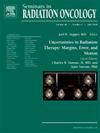Radiation-Therapy Related Salivary Dysfunction
IF 3.2
3区 医学
Q3 ONCOLOGY
引用次数: 0
Abstract
Radiation-induced xerostomia (RIX) is a common and debilitating side effect of head and neck cancer radiotherapy, significantly impacting patients' quality of life. This review comprehensively summarizes the current understanding of RIX, encompassing its clinical quantification, underlying pathophysiology, and established and emerging treatment modalities. We explore various objective and subjective measures used to quantify salivary flow and assess the severity of xerostomia in clinical settings. The pathophysiological mechanisms leading to RIX are elucidated, including radiation damage to salivary glands, alterations in saliva composition, and the role of inflammatory processes. Current treatment strategies, such as saliva substitutes and stimulants, are discussed alongside their limitations. Furthermore, we delve into novel investigational approaches, including gene therapy, stem cell transplantation, and pharmacologic interventions, offering promising avenues for future RIX management. This review provides clinicians and researchers with a comprehensive overview of RIX, highlighting the need for continued research to develop more effective preventative and therapeutic strategies to alleviate this burdensome condition.
放射治疗相关的唾液功能障碍
放射性口干症(RIX)是头颈癌放疗的常见副作用,严重影响患者的生活质量。这篇综述全面总结了目前对RIX的理解,包括其临床量化,潜在的病理生理学,以及建立和新兴的治疗方式。我们探索各种客观和主观的措施,用于量化唾液流量和评估严重程度的口干症在临床设置。导致RIX的病理生理机制被阐明,包括对唾液腺的辐射损伤、唾液成分的改变和炎症过程的作用。目前的治疗策略,如唾液替代品和兴奋剂,讨论了他们的局限性。此外,我们还深入研究了新的研究方法,包括基因治疗、干细胞移植和药物干预,为未来的RIX治疗提供了有希望的途径。这篇综述为临床医生和研究人员提供了对RIX的全面概述,强调了继续研究以开发更有效的预防和治疗策略以减轻这一繁重疾病的必要性。
本文章由计算机程序翻译,如有差异,请以英文原文为准。
求助全文
约1分钟内获得全文
求助全文
来源期刊
CiteScore
5.80
自引率
0.00%
发文量
48
审稿时长
>12 weeks
期刊介绍:
Each issue of Seminars in Radiation Oncology is compiled by a guest editor to address a specific topic in the specialty, presenting definitive information on areas of rapid change and development. A significant number of articles report new scientific information. Topics covered include tumor biology, diagnosis, medical and surgical management of the patient, and new technologies.

 求助内容:
求助内容: 应助结果提醒方式:
应助结果提醒方式:


